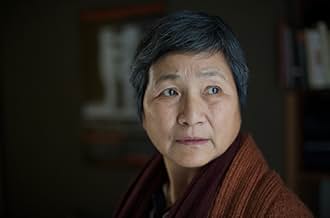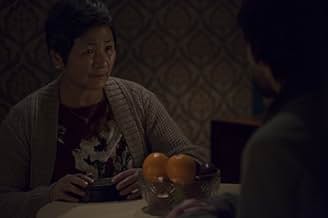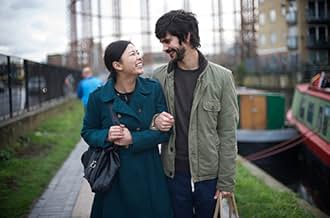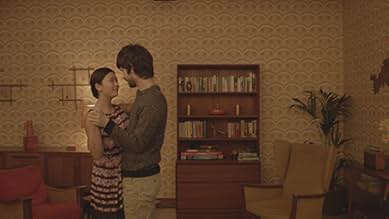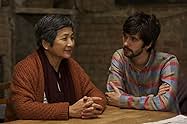A young man of French, Chinese, and Cambodian descent dies, leaving behind his isolated mother and his 4-year male lover, who grieve but don't speak a lick of each other's language.A young man of French, Chinese, and Cambodian descent dies, leaving behind his isolated mother and his 4-year male lover, who grieve but don't speak a lick of each other's language.A young man of French, Chinese, and Cambodian descent dies, leaving behind his isolated mother and his 4-year male lover, who grieve but don't speak a lick of each other's language.
- Nominated for 1 BAFTA Award
- 4 wins & 7 nominations total
- Junn
- (as Cheng Pei Pei)
- Vann
- (as Naomi Christie)
- Waiter
- (uncredited)
- Cafe customer
- (uncredited)
- Elderly Resident
- (uncredited)
- Café Customer
- (uncredited)
- Director
- Writer
- All cast & crew
- Production, box office & more at IMDbPro
Featured reviews
"Lilting" is an ambitious attempt to portray the cultural differences at play in a modern relationship. The story places a lot of emphasis on the filial duties of a Chinese child, and the anger of the mother whose son does not fulfill the supposed filial duties. This is surely mystifying to Western viewers, and the film does not really explain it that clearly. As I do understand this cultural context, I empathise with the story.
Two things that bug me though, is that Kai looks so Caucasian. I have huge trouble in believing that he is only a quarter English. The second thing is that the mother says he feels lonely during Christmas, which is clearly a line aimed at Western viewers because she would the most likely not be celebrating Christmas. She would be way more likely to feel lonely during Chinese New Year.
Overall, "Lilting" is not for everyone. The pacing is slow, but if you understand the cultural subtext then you will empathise with the story a lot.
In many Wong Kar Wai films the actors speak to each other in different languages with seeming full understanding. It suggests a disjuncture between time, place and culture, where language, usually the unifying factor within the narrative, becomes the source of each character's isolation. Lilting is self-conscious in its language play and it works powerfully to both comic and emotional effect. This has the magic effect of bending time. Locations are practically sparse, but the film gives the feeling of having moved us quite literally around the world.
The film demonstrates that with translation, there is always something essential that is lost. This might be cultural sensitivity, the feeling that we understand when, actually, we do not. Thus, it questions the assumptions we all make. It might also be the feeling that we know something or someone when actually we do not.
This may sound a heady, difficult mix. Far from it.
The film is beautifully shot, and again we experience something of the camera work of Christopher Doyle (Wong Kar Wai's leading cinematographer) in the delicate and soft palate of colours, and subtlety of framing which are as evocative as the language play in evoking mood and location. Nothing is wasted in this film. Even landmark pieces of music (another Wong motif) sit perfectly within the cross cultural narrative.
This is a film I will watch again and not simply for the references to Wong Kar Wai, It's a seamless depiction of loss in a world of seeming falling borders.
I hope you enjoy the film as much as I have.
When Richard enters the fold initially he seems like a stranger, at least as far as Junn is concerned, and to make it harder, he can't communicate with Junn as she can speak 8 different dialects, but refuses to learn English despite living in the UK. Despite their differences, despite the overwhelming obstacles to hurdle, Richard is not intending on giving up trying to talk to his partner's mother. They share the same pain, but Junn has no idea of this. Since Junn doesn't know about the same-sex relationship her son was having, Richard's job becomes at least twice as tough, as he has to act as Kai's 'best friend', trying to connect with Junn that they both are sharing the same misery, the same loneliness and sense of loss after losing a loved one.
Along the way Junn meets a gentleman who is also a resident at the home. Playing an amusingly dry old codger, Peter Bowles as Alan is smitten by Junn, yet they have no way of truly communicating. Richard rectifies this by hiring a translator, which helps both Alan and Richard as it opens up a dialog between the different parties, for better or worse. Richard continues to go to endless lengths to try and communicate and help Junn overcome her son's death, as unwilling as she seems, as well as trying to help negotiate the problems Junn and Alan are having; it seems the possibility of a relationship with Alan may be slim. And so the story goes, moving from this premise into emotional territory where each character's decision is not easy, and someone as stubborn as Junn makes life difficult for Richard and the translator he has to help smooth the process Which doesn't go as smoothly as planned.
This film is extremely depressing at points and heartwarming at others. It is nice to see a film with a real heart without dipping into overly sentimental trite. The true unforgettable message that this film gave me was how it illustrated how culture can truly alienate us; from loved ones, from people who want to help. But at the same time, it highlights elements of the human condition that transcend culture, such as family, or music. I didn't think I'd enjoy this as much as I did, it isn't my type of film really. But I really liked it. Probably also because I have seen how truly heart-breaking it is to make that decision to put a parent/grandparent in a home really is. It ain't pretty.
8/10 - If you aren't looking for action, and are interested in watching a more thought-provoking movie that really will pull at your emotions, check this one out. The absurdly low budget is not noticeable at all, especially given the quality of the production, from the perfect sequence of scenes, to the subtle but interesting photography work and the minimal but effective soundtrack.
This isn't a film that I will revisit immediately, unlike many others than have been released this year. But I know that a time will come where I suddenly will have to put this on. It is a powerful, emotional film that subtly comments on the differences of cultures and/or language, the stigma that is still attached to same-sex couples, especially among older, more 'traditional' people, but most importantly, a few key scenes show us that differences in culture, in language, in beliefs, can be transcended, and no matter what the barriers between communication may be, humanity can prevail.
It is not impossible to share true, meaningful moments with someone who cannot speak a word of your language. This film excels at showing this, linking us all as human, no matter our colour, our culture or our beliefs.
Did you know
- TriviaFilmed in 3 weeks.
- GoofsAt the scene when Ben Whishaw and Andrew Leung were on bed, Ben says "You're really gonna do that?", but his lips don't move.
- Quotes
Junn: Through plenty of crying, I've learnt to be content that I won't always be happy, secure in my loneliness, hopeful that I will be able to cope. Every year on Christmas Day I get very lonely. An incredible feeling of solitude. On this day, everything has stood still, even the trees have stopped rustling, but I'm still moving, I want to move, but I have nothing to move to, and nowhere to go. The scars beneath my skin suddenly surface and I get scared. Scared of being alone.
- ConnectionsFeatured in Lilting: Deleted Scene (2014)
- SoundtracksYe Lai Xiang
Performed by Xiang Lan Li
- How long is Lilting?Powered by Alexa
Details
Box office
- Gross US & Canada
- $27,054
- Opening weekend US & Canada
- $1,567
- Sep 28, 2014
- Gross worldwide
- $247,377
- Runtime1 hour 23 minutes
- Color
- Aspect ratio
- 2.35 : 1
Contribute to this page









